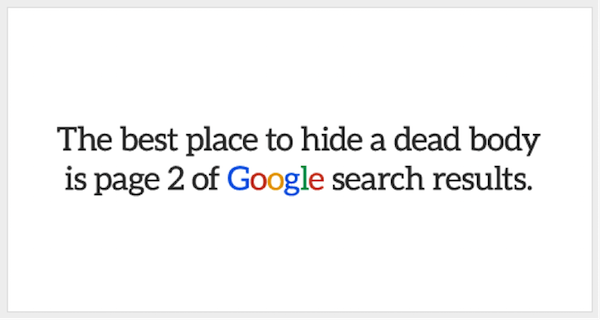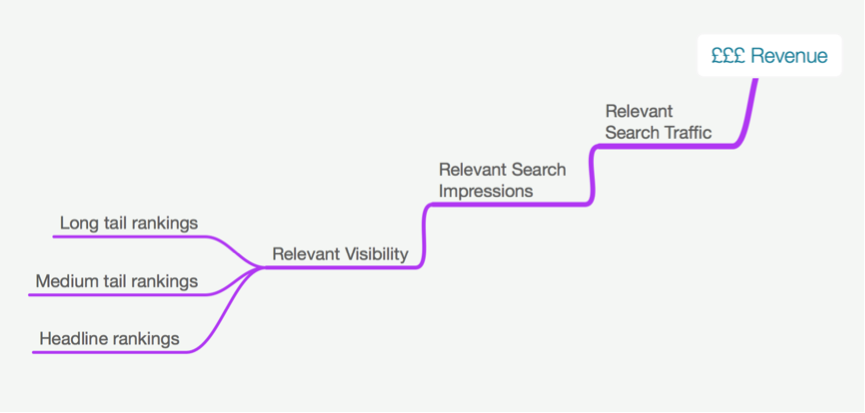Rankings – it’s not a dirty word
By Stacey MacNaught
I have a confession. I still check rankings.
Not only do I use the Moz toolset to track rankings for my clients, but I run manual checks, have a mobile app to run checks on the go and make a point to take a look through the keywords listed for our clients in SearchMetrics each week.
Yes, I’m fully aware it’s 2015.
Since I started in SEO in 2009, a host of things have changed beyond recognition. But one thing has been consistent: what truly matters is ROI.
Ultimately, it’s all about the money driven through a website by SEO – not the things we’re often guilty of obsessing about along the way.
Among the things that have changed are:
• The skills required within a successful SEO team, where a much broader skillset is now essential
• How we procure the brand signals (yes, including links) we require, which has taken us into the realm of content marketing and again expanded the skills required
• The number of screen sizes we need to cater for
• The quality of content produced by SEOs
The wrong diagnosis
But perhaps the most surprising change is the shift in attitude – in certain corners of our industry – towards rankings. Posts and opinion stating the “death” of rankings are completely misplaced.
I accept that rankings have changed. Multiple devices, richer search results and increased personalisation are among the factors influencing this change.
I accept that what’s number one for me for any given search may not be number one for you.
And I also accept that, in many ways, we have less control over rankings.
In 2009, those with the highest volume of (bought) links invariably held the big headline rankings. Today, big rankings are often held by big brands. SEO alone (in the traditional sense) isn’t sufficient to compete effectively for competitive audiences in search. Much wider brand signals are at play and, in a landscape where link building must be organic, brands perform well because they tend to naturally acquire these signals at scale.
But I still give a crap about rankings, and I still check them regularly. They’re an indicator that things are on the up.
And, for as long as people use search engines and search engines display organic results, I’m of the mindset that rankings are very much alive and kicking.
The state of play with rankings
Rankings have been declared a “dead” metric several times, both in blog posts and at conferences, and similarly in conversations and debate during events surrounding conferences.
It surprises me.

Big rankings still mean big traffic, and big, relevant traffic on a site that’s ready to convert still means big money.
The difference between being middle of the first page and middle of the second is still phenomenal.

Image credit: http://digitalsynopsis.com/tools/google-serp-design/
A place in the top 10 for “cheap holidays,” “car insurance,” “secured loans,” or “e-cigs,” for example, will have an impact on the bottom line.
Granted, some people’s results might be different. There are examples of people holding positions on desktop that they don’t hold on mobile. And personalisation can influence your position in any given user’s results.
But if you’re in the top three (Google Incognito for personalisation free checks) for a big, non-local term, you’re likely to be in that position for the overwhelming majority in the same country. All our data points to this.
Metrics-a-many
I get a kick out of achieving rankings, mostly because I like the fact a big ranking can mean a massive influence on revenue within an hour or two. In other words, you can watch revenue arrive almost in real time as the result of a ranking.
But despite this, we do not focus solely on a small handful of headline keywords on campaigns. We’re likely to have headline, long-term target search phrases. But we’re also focused on variants, medium and long-tail, and overall domain visibility.
We’ve seen examples where a headline ranking might mean thousands of visits each day – but where we have then also been able to match or even better it through a combination of medium, long-tail and close variants of that keyword.
Everything we measure has some impact, directly or indirectly, on the end goal.

Rankings are a part of the picture because they lead to your site showing up in search for the things your target audience and customers are looking for. That, in turn, sends relevant traffic, which in turn means revenue.
And, even further up that funnel, we measure brand signals acquired and other metrics that will influence this route to revenue.
Rankings – far from dead
I’ll care about search engine visibility for as long as people are using search engines.
And for as long as there is organic presence on Google’s first page (who knows what that situation will look like in a decade?), I’ll be pursuing space on it for my clients.
Because great rankings, in my experience, equate to revenue.
And that’s what really matters.
—
Disagree? Do you think rankings are dead? Let us know in the comments box below.

Get 123 pages of expert advice straight to your inbox.
-
Apps (46)
Content Marketing (67)
Digital PR (1)
Integrated Marketing (3)
Multi Screen (12)
News (99)
PPC (2)
Search (120)
Tecmark (70)
Uncategorized (2)

About the Author


